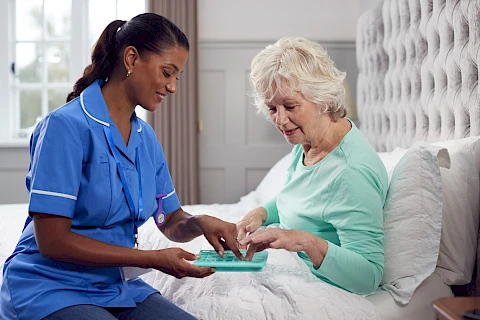
Caring for seniors with chronic conditions can sometimes be challenging. These health issues require ongoing management and specialized attention as they persist over time. Caregivers who stay informed and proactive can transform the quality of life for seniors and help them maintain their independence and health. Explore how caregivers can effectively help in managing chronic conditions.
What Are Chronic Conditions?
Chronic conditions like diabetes, arthritis, heart disease, and Alzheimer's are common among seniors. These health issues can significantly impact daily life, making tasks that once seemed simple now more difficult. Seniors may struggle with mobility, memory, or managing their diet. Knowing the specific chronic conditions affecting a senior can help caregivers provide the right support. Knowledge allows caregivers to anticipate needs and problems, promoting a better level of well-being.
Medication Management
One of the most critical aspects of caring for someone with a chronic condition is medication management. Here are a few tips to help caregivers tackle this all-important task:
- Stay Organized — Medications can more easily be managed by using daily or weekly pill organizers or compartmentalized boxes to simplify dose requirements.
- Keep a Medication Schedule — A consistent medication schedule ensures doses are taken correctly and on time. Making it part of the daily routine can help.
- Take Advantage of Technology — Utilize tools and technologies like smartphone apps or alarms to remind you when medications are due. Some of these even include refill reminders and potential drug interaction alerts.
- Make a List — Keep an up-to-date list of medications and dosages and review it regularly with healthcare providers to avoid any conflicts or side effects.
Coordinate With Healthcare Providers
A strong relationship with healthcare providers can significantly aid in managing chronic conditions. Keep a calendar of all appointments and make sure seniors attend every one of them for best results and outcomes. Maintain accurate and comprehensive medical records, including test results and prescribed treatments. Communicate regularly with doctors and specialists. Prepare questions before visits and take notes during appointments to ensure nothing is missed.
Support Lifestyle Adjustments
Lifestyle also plays a huge part in managing chronic conditions. As a caregiver, you can support healthy lifestyle changes by encouraging a balanced diet rich in essential nutrients. Consult a nutritionist to create meal plans that align with the senior's health needs. Physical activity is also crucial, so talk to the senior's doctor to determine which exercises suit their abilities and health situation. Activities like walking, swimming, or yoga are often good choices. Adapt the home environment to make everyday activities easier and safer. This may include installing grab bars, improving lighting, or rearranging furniture to prevent falls.
The Benefits of Caregiver Education
Education is empowering for effective caregiving and caregivers do better when they understand the health conditions they are managing. Enrolling in caregiver training programs or workshops can boost knowledge and skills. Stay informed by researching online and reading about the latest treatment options and care strategies for chronic conditions. It can be incredibly helpful to join caregiver support groups where experiences and advice are shared among peers facing similar challenges.
Senior Helpers Boston North Can Assist With Chronic Conditions
Senior Helpers offers comprehensive, in-home senior care services to meet the individual needs of our community's seniors and their families. If you live in the North Shore, Merrimack Valley, Cape Ann, or Burlington areas, contact us anytime at Senior Helpers Boston North. We support caregivers and seniors and ensure they confidently face the future.